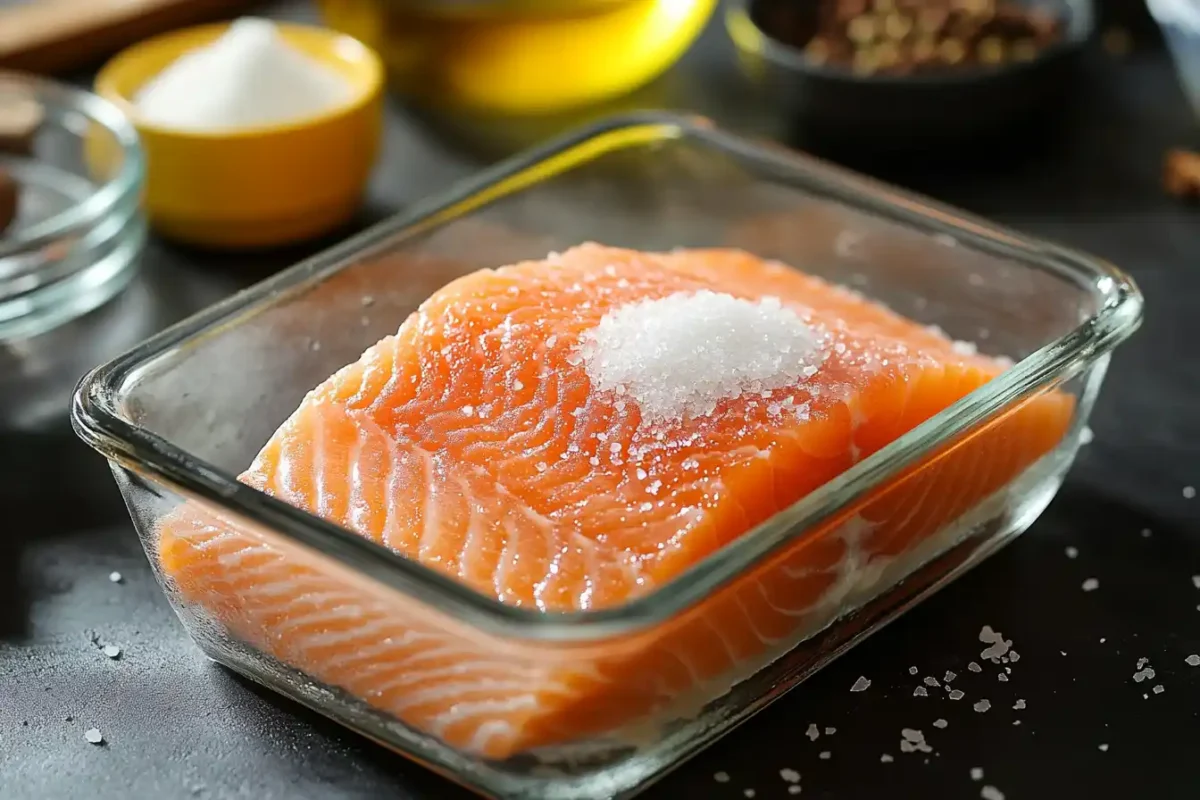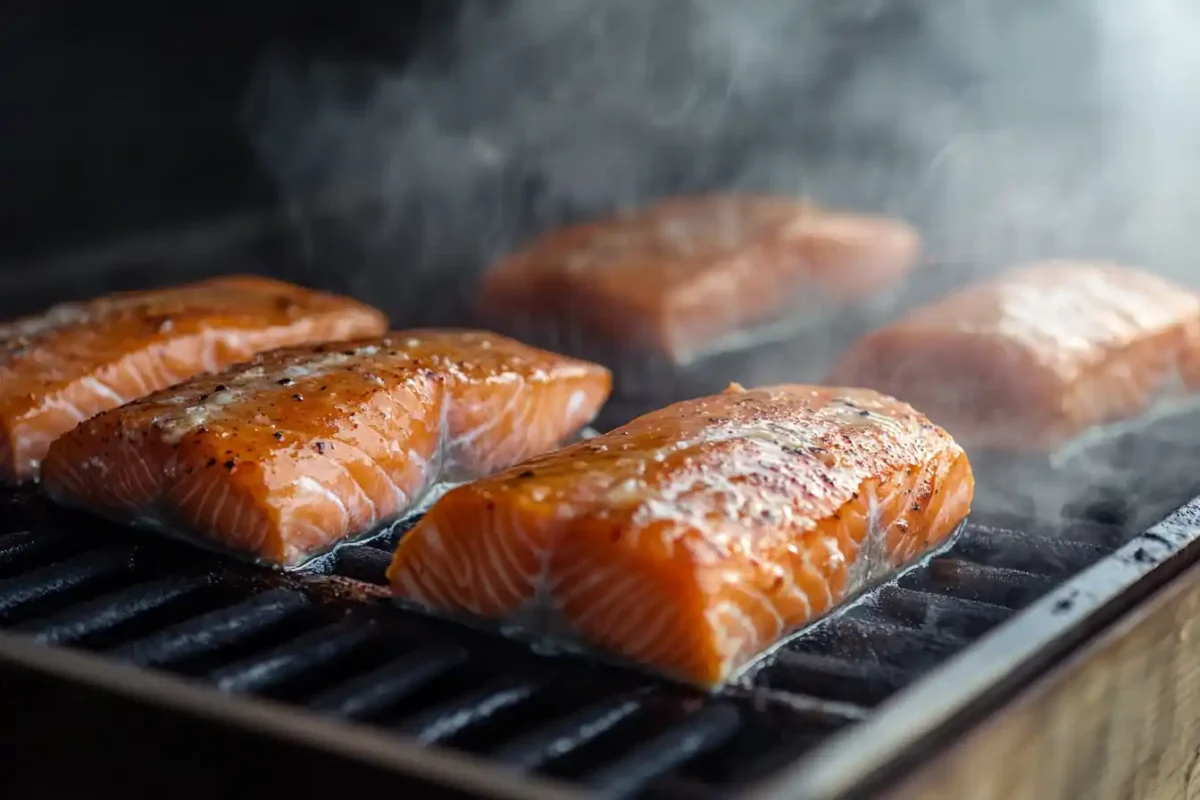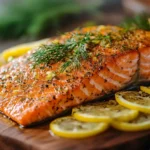Smoking salmon at home can feel like an art one that requires patience, precision, and just the right balance of flavors. If you’ve ever asked yourself, “Should I brine my salmon before I smoke it?”, you’re not alone. The secret to achieving that silky, rich, and perfectly smoked salmon lies in one crucial step: brining.
But why is brining so important? Can you skip it? How long should you brine salmon before smoking? Today, we’re diving deep into the science, techniques, and common mistakes to ensure you get that perfect bite every single time.
Why Smoked Salmon Is a Must-Try (Flavor, Texture, and Benefits)
Imagine this: You wake up on a Sunday morning, craving something special for breakfast. You toast a fresh bagel, spread a thick layer of cream cheese, and top it with thin slices of delicately smoked salmon. The taste? A perfect balance of smoky, salty, and buttery goodness.
Smoked salmon isn’t just a breakfast staple it’s a gourmet delight. The reason it stands out is its tender texture, rich umami flavor, and incredible versatility. You can enjoy it on its own, in salads, or even in pasta dishes. But before we jump into recipes, let’s get to the most common question: Should I brine my salmon before I smoke it?
Should I Brine My Salmon Before I Smoke It? (Expert Answer)
The short answer? Yes! Brining your salmon before smoking is non-negotiable if you want the best flavor and texture. Without a proper brine, your salmon can turn out dry, bland, or overly smoky.
Benefits of Brining Salmon Before Smoking
Brining does three essential things:
- Retains Moisture – Salt draws out some moisture while helping the fish reabsorb flavorful brine, preventing dryness.
- Enhances Flavor – A good brine infuses the salmon with seasonings, making it more flavorful.
- Creates a Pellicle – This thin, tacky layer helps smoke adhere evenly, giving you that rich, smoky taste.
How Long Should You Brine Salmon?
Brining time depends on the thickness of your salmon fillet:
- Thin fillets (½ inch or less): 4 to 6 hours
- Medium fillets (¾ inch): 6 to 8 hours
- Thick fillets (1 inch or more): 12 hours (overnight)
What Happens If You Skip the Brine?
If you decide to skip brining, your salmon might:
- Dry out during smoking
- Lack depth in flavor
- Absorb smoke unevenly
This is why every professional chef and pitmaster brines their salmon before smoking.
Essential Ingredients for Smoked Salmon

Here’s a quick look at what you need to create the perfect smoked salmon.
| Ingredient | Purpose |
|---|---|
| Fresh salmon fillet | The star of the dish |
| Kosher salt | Draws out moisture and enhances flavor |
| Brown sugar | Balances saltiness and adds sweetness |
| Black pepper | Adds a mild spice kick |
| Garlic powder | Enhances the umami flavor |
| Lemon zest | Adds brightness and freshness |
| Water | Dissolves salt and sugar for even brining |
How to Make the Perfect Salmon Brine (Easy Recipe)
A good brine strikes the perfect balance between salt, sugar, and aromatics to enhance the natural richness of salmon.
Ingredients for the Brine
Before we jump into the method, here’s what you’ll need:
| Ingredient | Quantity | Purpose |
|---|---|---|
| Cold water | 4 cups | Forms the base of the brine |
| Kosher salt | ½ cup | Helps retain moisture and seasons |
| Brown sugar | ½ cup | Balances saltiness with mild sweetness |
| Black pepper | 1 tsp | Adds a subtle heat |
| Garlic powder | 1 tsp | Boosts umami flavor |
| Lemon zest | 1 tbsp | Adds a fresh, citrusy brightness |
Step-by-Step Guide: How to Brine and Smoke Salmon
Step 1: Preparing the Brine
Start by combining water, salt, sugar, pepper, garlic powder, and lemon zest in a large mixing bowl. Stir well until the salt and sugar are completely dissolved. If desired, you can slightly heat the water for better dissolving—just make sure to cool it down completely before using it.
Step 2: Submerging the Salmon
Place your salmon fillet in a large glass dish or food-safe plastic container. Pour the brine over the fish, making sure it’s fully submerged. Cover and refrigerate for the recommended brining time based on thickness:
- Thin fillets (½ inch or less): 4 to 6 hours
- Medium fillets (¾ inch): 6 to 8 hours
- Thick fillets (1 inch or more): 12 hours (overnight)
Step 3: Rinsing and Drying the Salmon
Once the brining time is up, remove the salmon from the liquid and rinse it under cold water to remove excess salt. Gently pat the fish dry with paper towels.
Now, here’s the secret step: Let the salmon air-dry on a wire rack in the refrigerator for at least 2 hours. This helps develop a pellicle, a thin sticky layer that allows smoke to adhere evenly for that signature smoked salmon taste.
Step 4: Smoking the Salmon
Now, let’s get to the fun part smoking!
Best Temperature for Smoking Salmon
The ideal smoking temperature for salmon is 180-200°F (82-93°C).
- Light smoke flavor: 1.5-2 hours
- Deep smoky flavor: 3-4 hours
If you’re using a charcoal or wood smoker, mild woods like applewood, cherry, or alder provide the best smoky flavor without overpowering the fish.

Step 5: Resting and Serving the Smoked Salmon
Once your salmon reaches an internal temperature of 140°F (60°C), remove it from the smoker and let it rest for 10-15 minutes before slicing.
Pair it with:
- Cream cheese & bagels for breakfast
- Salads for a refreshing meal
- Pasta dishes for a gourmet twist
Common Problems and How to Fix Them
Even experienced cooks face challenges when smoking salmon. Here’s how to troubleshoot the most common issues:
| Problem | Cause | Solution |
|---|---|---|
| Salmon is too salty | Over-brining | Reduce brining time or use less salt |
| Fish is too dry | Over-smoking | Lower temperature and reduce smoking time |
| Too much smoke flavor | Strong wood choice | Use milder woods like apple or alder |
| Uneven texture | Skipped pellicle step | Let salmon air-dry before smoking |
FAQs About Brining and Smoking Salmon
Can I skip the brining step when smoking salmon?
Technically, yes, but your salmon will be drier, less flavorful, and won’t develop the right texture. Brining enhances moisture retention, seasoning, and smoke absorption. If you want the best results, don’t skip it!
What’s the best type of salt for brining salmon?
Always use kosher salt or sea salt. Avoid table salt, as it contains iodine, which can give your salmon a bitter taste.
How do I know when my smoked salmon is fully cooked?
Use a meat thermometer to check the internal temperature. Smoked salmon is perfectly cooked when it reaches 140°F (60°C).
Can I reuse the brine for another batch of salmon?
No, always discard used brine. It contains bacteria from raw fish and should never be reused. If you need more brine, make a fresh batch.
Explore More Delicious Recipes
- The Best Smoked Salmon Brine at Home
- Dry Brined Smoked Salmon at Home
- How to Make a Salmon Brine Recipe
Final Thoughts: Is Brining Worth It?
So, should you brine your salmon before smoking? Absolutely. It’s the secret ingredient that separates dry, bland salmon from the juicy, flavor-packed salmon you crave.
With the right brine, drying process, and smoking technique, you’ll never settle for store-bought smoked salmon again!
Try this method and let me know how it turned out.
Happy cooking with Rita Chef ❤️!
Print
Brining Smoked Salmon
- Total Time: eight to eighteen hours
- Yield: four servings
Description
Smoked salmon with a rich smoky aroma and delicate texture starts with a good brine This recipe ensures your salmon stays moist flavorful and perfect every time
Ingredients
Fresh salmon fillet cold water kosher salt brown sugar black pepper garlic powder lemon zest
Instructions
In a large bowl mix cold water kosher salt brown sugar black pepper garlic powder and lemon zest until fully dissolved Place the salmon fillet in a glass dish and pour the brine over it ensuring it is fully submerged Cover and refrigerate for six to twelve hours depending on thickness Remove the salmon from the brine rinse under cold water and pat dry Place the salmon on a wire rack in the refrigerator for two hours to form a pellicle Preheat the smoker to 180-200°F using applewood or cherry wood chips Place the salmon in the smoker and cook for two to four hours until it reaches an internal temperature of 140°F Let rest for ten minutes before serving
Notes
Do not brine salmon for more than twenty-four hours as it can become too salty and break down in texture Always allow the pellicle to form before smoking for better smoke absorption Use mild woods like applewood or cherry to avoid an overpowering smoky taste
- Prep Time: ten minutes
- Cook Time: two to four hours
- Category: Main Course
- Method: Smoking
- Cuisine: American
Nutrition
- Serving Size: one portion
- Calories: approximately 200
- Sugar: 3g
- Sodium: 500mg
- Fat: 8g
- Saturated Fat: 1g
- Unsaturated Fat: 5g
- Trans Fat: 0g
- Carbohydrates: 5g
- Fiber: 0g
- Protein: 25g
- Cholesterol: 50mg

